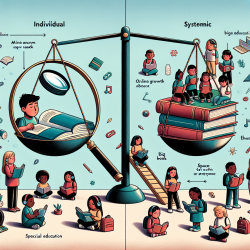The intricate relationship between language disorders and learning disabilities in children necessitates a collaborative and informed approach to education and therapy. The research article, The Role of the Speech/Language Pathologist in the Management of the Learning Disabled Child with Language Problems, by Sybil Schwartz and Sandra McCaig, underscores the pivotal role speech/language pathologists (SLPs) play in diagnosing, treating, and managing learning disabilities that are rooted in language problems. This blog post aims to guide practitioners in refining their skills by leveraging the insights from this research, while also encouraging further exploration into this critical area.
Learning disabilities, particularly those associated with language, present a complex challenge that requires a nuanced understanding and approach. Not all children diagnosed with learning disabilities struggle with oral language problems, but for those who do, SLPs are crucial in providing the necessary support. The linguistic underpinnings of most academic subjects make it essential for SLPs to be involved both directly, through assessment and remediation, and indirectly, by expanding the knowledge and understanding of language problems among special education and classroom teachers.
Here are several strategies derived from the research findings that can help practitioners improve their practices:
- Interdisciplinary Collaboration: Recognize the importance of a team approach that includes educators, psychologists, and other relevant professionals. This collaboration is vital for developing comprehensive and effective intervention strategies.
- Professional Development: Stay abreast of the latest research and techniques in speech pathology and learning disabilities. Engaging in continuous learning through workshops, conferences, and publications is essential for delivering high-quality care.
- Parent and Teacher Education: Develop and implement programs to educate parents and teachers about language development and strategies to facilitate language acquisition. Their involvement is critical in the child's learning process.
- Direct Intervention: Employ evidence-based practices for assessing and treating language disorders. Tailor interventions to address the specific language deficits affecting the child's academic performance, such as phonological awareness, syntax, and semantics.
- Advocacy for Adequate Resources: Advocate for sufficient resources and support within the educational system to ensure that children with language-based learning disabilities receive the attention and intervention they need.
- Assessment and Program Planning: Participate actively in the assessment of individuals suspected of having learning disabilities to determine the presence or absence of a language disorder. This also involves program planning and development for those diagnosed with language disorders.
Moreover, understanding the diverse nature of language problems and their impact on academic learning is crucial. For instance, auditory processing problems can significantly hinder academic achievement, affecting everything from phonics learning to reading comprehension. Therefore, SLPs must be adept at identifying and addressing these varied issues through targeted interventions.
The research also highlights the necessity for SLPs to extend their expertise beyond traditional therapy roles. This includes contributing to the development of educational strategies and resources, as well as engaging in direct clinical intervention, consultation, and support for students and teachers in both regular and special education settings.
However, the challenge of heavy caseloads and the need for intensive treatment highlight the ongoing struggle to meet the individual needs of each child. This underscores the importance of advocating for better resource allocation and the development of alternative methods of service delivery to provide comprehensive assessment and treatment programs.
Ultimately, the goal is to create an educational environment where children with language-based learning disabilities can thrive. This requires a concerted effort from SLPs, educators, parents, and administrators to ensure that these students receive the specialized support they need to succeed academically.
In conclusion, the role of the speech/language pathologist in managing learning disabilities associated with language problems is multifaceted and indispensable. By implementing the outcomes of the research presented by Schwartz and McCaig, practitioners can significantly enhance their skills and contribute to the overall success of children with learning disabilities. For those interested in delving deeper into this topic, the original research paper provides a wealth of information and can be accessed here.










